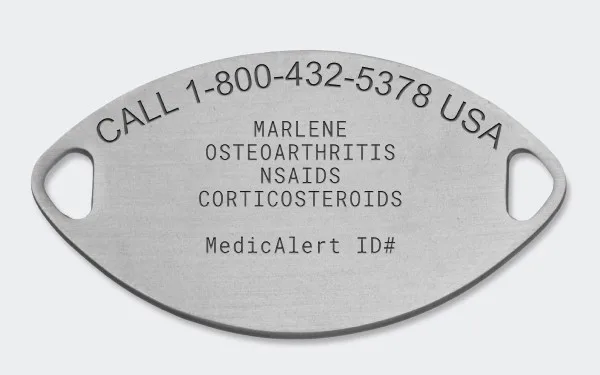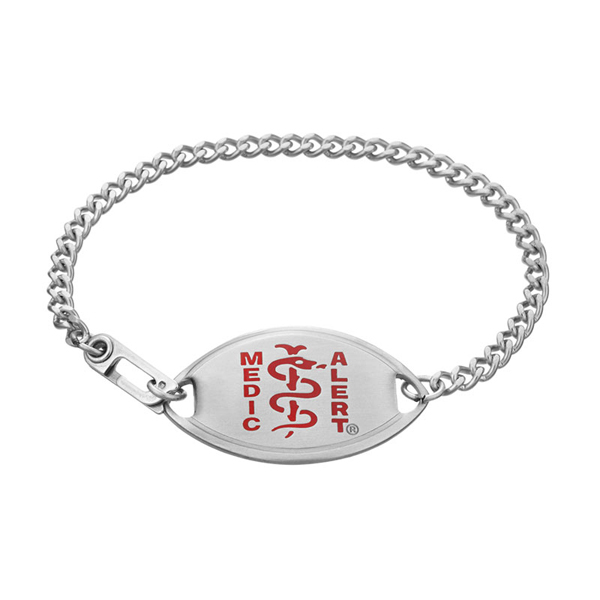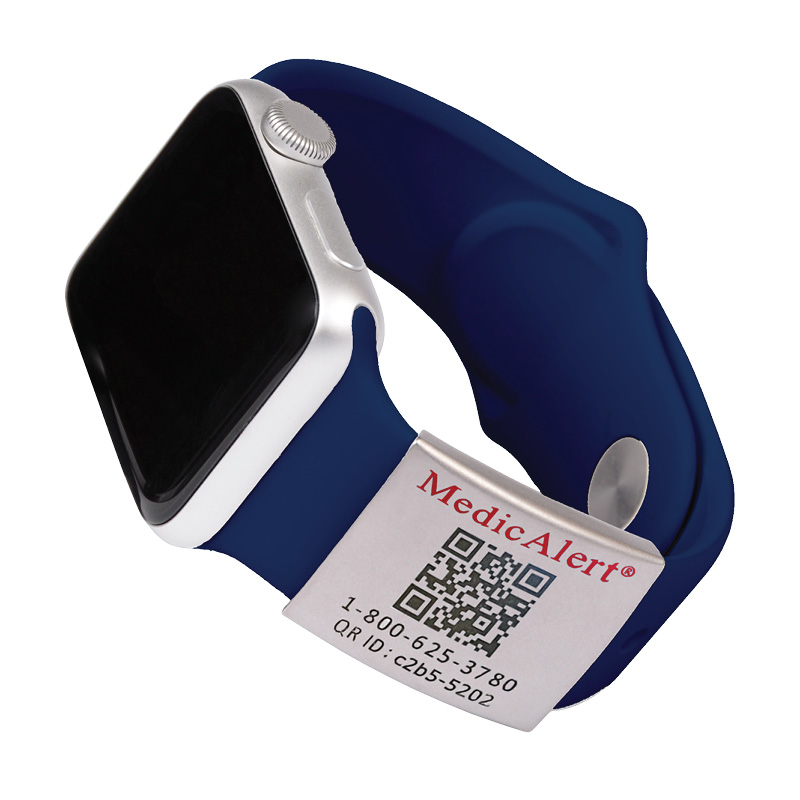Help others help you. Wear a medical alert ID bracelet or necklace engraved with important information for emergency responders and healthcare providers.
Centers for Disease Control & Prevention

Medical IDs for Arthritis
Arthritis affects millions of people each year in the United States. Read below to learn how a medical ID can protect you and your loved ones.
The confidence to live with arthritis
Arthritis, a joint disease that causes pain and discomfort during movement, affects millions of people each year in the United States. There are many distinct types of arthritis with different causes, symptoms, and treatments.
Understanding your arthritis diagnosis and the best ways to manage it can help you to live a more comfortable and active life. Many people have successfully found strategies that work well for their arthritis symptoms.
This is one of the many reasons why people living with this condition should wear a MedicAlert medical ID for arthritis.
How MedicAlert protects those living with arthritis
One thing you shouldn’t worry about is what could happen in a health emergency. MedicAlert’s protection plans offer benefits that extend beyond the ID, providing safety and peace of mind for people living with arthritis, their families and caregivers.

24/7 Emergency Response
Our team provides first responders the information they need to provide fast, accurate care.

Digital Health Profile
All your vital information, all in one place for you and your caregiver.

Emergency Contact Notification
In an emergency, we connect families so that no one is alone in a crisis.

Patient Instructions
Share the information that’s important to your care, such as use of rescue medications or contraindication for tests like MRIs.
Pair a medical ID for arthritis with the protection plan that’s right for you.
What exactly is arthritis?
The term “arthritis” is commonly used to describe joint inflammation, swelling, or stiffness, but there are actually over 100 types of arthritis. Arthritis affects 24% or 58.5 million adults in the United States, and a form of arthritis called juvenile arthritis (JA) affects 300,000 children and teens.
Some common types of arthritis include:
- Osteoarthritis
- Rheumatoid arthritis (RA)
- Lupus
- Fibromyalgia
- Juvenile arthritis (also called juvenile idiopathic arthritis or JIA)
- Gout
All types of arthritis involve inflammation, which can have several different causes.
What causes arthritis?
Because there are many different types of arthritis, there isn’t one single cause that explains the condition. And the underlying problem that triggers some forms of arthritis isn’t well understood. Scientists have identified common risk factors and causes of arthritis.
According to the Mayo Clinic, risk factors include:
- Genetics– if you have other family members with a history of arthritis, you may be more likely to develop it, too
- Age– older adults have a higher likelihood of developing many types of arthritis than younger adults do
- Sex– women are at higher risk for rheumatoid arthritis, for example, and men are at higher risk for gout
- Joint injury– a past joint injury can make it more likely for arthritis to develop in that joint
- Obesity– extra weight on joints can add to wear and tear and cause arthritis, especially in the knees, hips, and spine
Underlying problems that cause arthritis include:
- Wear and tear– some jobs and sports activities, for example, can affect the joints over time
- Autoimmune problems– rheumatoid arthritis is caused by the immune system attacking the joints, and conditions like lupus and psoriasis can cause inflammation that damages joints
- Too much uric acid– this specific problem results in gout
- Certain infections– some viral infections are thought to trigger arthritis inflammation
There’s also evidence that whole-body inflammation caused by lifestyle, immune system changes, diet, stress, and even smoking can contribute to the development of some types of arthritis.
What are the symptoms and complications of arthritis?
As you can imagine, inflammation and joint damage can cause a host of symptoms and long-term complications. Some types of arthritis are linked to other serious health problems as well.
Common joint symptoms include:
- Pain
- Stiffness
- Swelling
- Redness
- Difficulty moving
These symptoms can range from mild to severe, depending on the type of arthritis, a person’s level of activity, and other factors.
Complications of arthritis also vary, depending on the type of arthritis. Common problems include trouble walking and completing daily activities due to joint damage.
Rheumatoid arthritis has been linked to the following health concerns:
- Infections
- Heart problems
- Lung disease
- Rheumatoid nodules
- Carpal tunnel syndrome
- Lymphoma
- Sjogren’s syndrome (resulting in dry eyes and mouth)
- Osteoporosis
Some of these complications can be serious. It’s important to ask your doctor about warning signs of any problems and to follow any recommendations to lower your risk of these health conditions. Using medical IDs for arthritis and a Protection Plan is also key to ensuring you have the right care if you have an arthritis diagnosis and any of these complications result in a medical emergency.
What are the symptoms and complications of arthritis?
Diagnosing arthritis starts with your doctor taking a history of your symptoms and performing a physical exam. They will look at each of your joints and feel for any swelling or warmth. There are also some tests that can be done to help confirm the diagnosis and pinpoint the type of arthritis:
- Antinuclear antibody (ANA) test– This blood test looks for a specific antibody that can be elevated in some types of arthritis
- Sedimentation (SED) rate – This blood test can identify inflammation in the body
- RF (rheumatoid factor) – This blood test can help diagnose rheumatoid arthritis
- CCP (cyclic citrullinated peptide) test – This is another blood test that is specific for rheumatoid arthritis
- Uric acid – If this is elevated, it can help diagnose gout
- Joint aspiration – Your doctor takes a sample of synovial fluid from a joint and tests for crystals or bacteria
- X-rays or other imaging tests – These are used to look at joint damage
- HLA tissue typing – This can find genetic markers of a type of arthritis called ankylosing spondylitis
- Skin biopsy – Small tissue samples can be examined for signs of lupus or psoriatic arthritis, which affect the skin
- Other lab tests – A complete blood count, urine tests, and kidney function may also be checked as part of your full medical workup to diagnose arthritis
Engraving on your MedicAlert ID for arthritis
MedicAlert offers free custom engraving on all our arthritis bracelets and other medical ID products. The engraving on medical IDs for arthritis should include any critical medical information that can protect and save lives in case of an accident or a medical emergency.
The best things to engrave on a medical bracelet for arthritis include:
- Medical history (including type of arthritis)
- Medications
- Allergies
- Any other important details for first responders to know right away

Sample engraving. Consult our team if you need help engraving your medical ID for arthritis.
Find your medical ID.
How do you treat, manage, and live with arthritis?
There are many different treatment approaches for arthritis. The best one for your diagnosis will depend on the type of arthritis, your symptoms, the level of joint damage, and the goals you set with the help of your healthcare team. This team can include your doctor, a rheumatologist, an orthopedist, physical and occupational therapists, and more.
Treatment options that your healthcare team may recommend include:
- Medications– non-steroidal anti-inflammatory drugs (NSAIDs) like ibuprofen and aspirin, and other pain medications can help relieve symptoms.
- Splints or braces– immobilizing a problem joint can help provide support and reduce discomfort.
- Massage– to relieve any muscle discomfort.
- TENS (transcutaneous electrical nerve stimulation) devices– these use electrical signals to block pain impulses.
- Heat and cold applications– heat (like a hot shower, or a heating pad) can improve pain and stiffness; cold can improve swelling and pain.
- Acupuncture– some people find relief with this procedure which involves inserting tiny needles into the skin in specific areas.
- Surgery– in some cases, procedures to repair joint damage or replace joints offer the best relief.
- Corticosteroids– these medications reduce inflammation, and can be taken by mouth or are sometimes injected into a joint.
- Disease-modifying anti-rheumatic drugs (DMARDs)– this class of medication works with the immune system to reduce symptoms from autoimmune arthritis such as rheumatoid arthritis or lupus.
- Hyaluronic acid– a type of joint fluid that is lacking in arthritis, this can be injected into joints to help improve symptoms.
Living with arthritis? Get peace of mind.
Pair your ID with a MedicAlert Membership.

We'll be your voice. If you can't speak for yourself, your ID will speak for you, informing others about your arthritis and any medications you are taking.
We provide 24/7 emergency protection. Our team will relay your critical medical information to first responders in an emergency, no matter where or when it happens.
We keep you connected. You or a loved one should never have to be alone in an emergency. That’s why MedicAlert will reach out to your emergency contacts when needed if you are unable to do so.
We enable you to live with confidence. Enjoy the confidence to live your life with arthritis, knowing that MedicAlert is there for you when you need us most.
DISCLAIMER: THIS WEBSITE DOES NOT PROVIDE MEDICAL ADVICE. The information in this article is presented for educational purposes only and is not intended as a substitute for professional medical advice, diagnosis and treatment. Always seek the advice of a physician or other qualified healthcare provider for any questions you may have regarding a medical condition or treatment.



